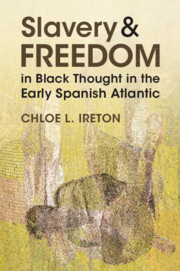Book contents
- Reviews
- Slavery and Freedom in Black Thought in the Early Spanish Atlantic
- Afro-Latin America
- Slavery and Freedom in Black Thought in the Early Spanish Atlantic
- Copyright page
- Contents
- Figures
- Acknowledgments
- Introduction
- 1 Proving Freedom
- 2 Imagining Freedom
- 3 Purchasing Freedom
- 4 Defining Freedom
- 5 Reclaiming Freedom
- 6 Practicing Freedom
- Coda
- Bibliography
- Index
5 - Reclaiming Freedom
The Illegitimacy of Slavery in Black Thought
Published online by Cambridge University Press: 28 November 2024
- Reviews
- Slavery and Freedom in Black Thought in the Early Spanish Atlantic
- Afro-Latin America
- Slavery and Freedom in Black Thought in the Early Spanish Atlantic
- Copyright page
- Contents
- Figures
- Acknowledgments
- Introduction
- 1 Proving Freedom
- 2 Imagining Freedom
- 3 Purchasing Freedom
- 4 Defining Freedom
- 5 Reclaiming Freedom
- 6 Practicing Freedom
- Coda
- Bibliography
- Index
Summary
Ephemeral conversations between enslaved people about the laws of slavery and freedom constituted an exchange of precious knowledge and legal know-how that shaped Black life and thought in the early Atlantic world. This chapter explores enslaved people's petitions to the crown for freedom on the basis that their enslavement was illegitimate to write a history of ideas among enslaved Black people about the illegitimacy of certain types of enslavements in the Spanish empire. These petitions are indicative of a rich landscape of ideas about freedom and slavery among free and enslaved Black people in the sixteenth and early seventeenth centuries, and their engagement with Castilian rules of law of slavery and freedom. They argued that they were legally free and that their freedom had been stolen from them. Pedro de Carmona, for example, protested in his petition in 1547 about the “great injury and disturbances (agravios y turbación) that have been done to my liberty.” The chapter traces how enslaved Black litigants accrued this know-how through their discussions with other enslaved and free Black people during their desperate pursuits to reclaim the freedom that had been stolen from them.
Keywords
- Type
- Chapter
- Information
- Publisher: Cambridge University PressPrint publication year: 2024

